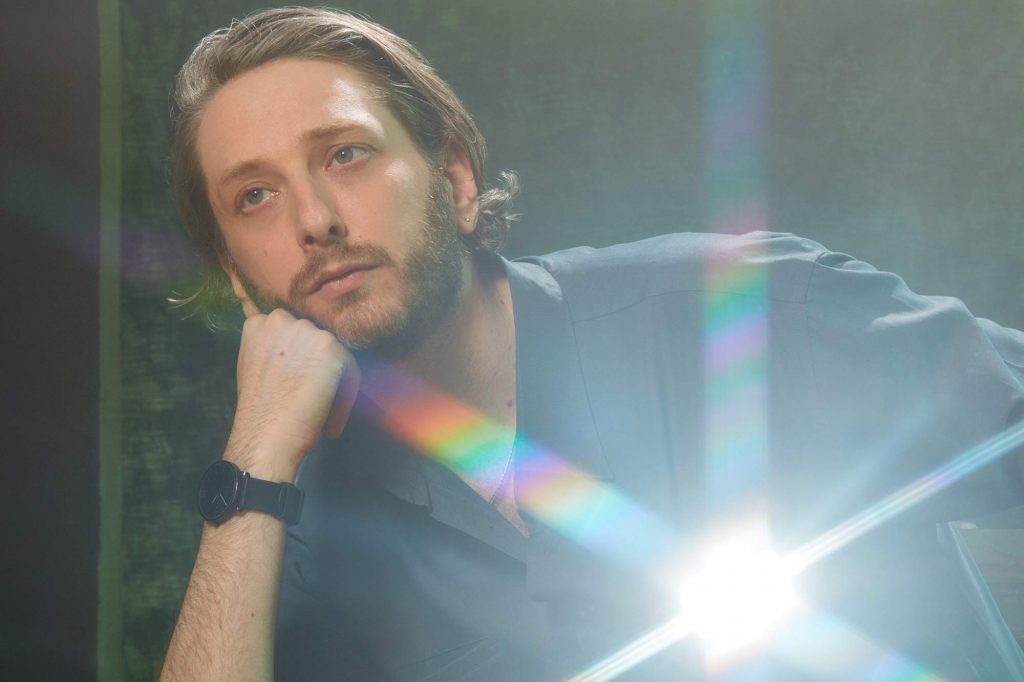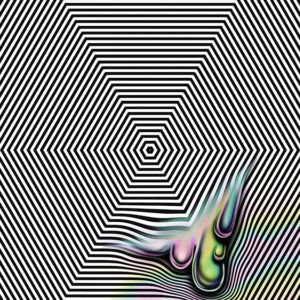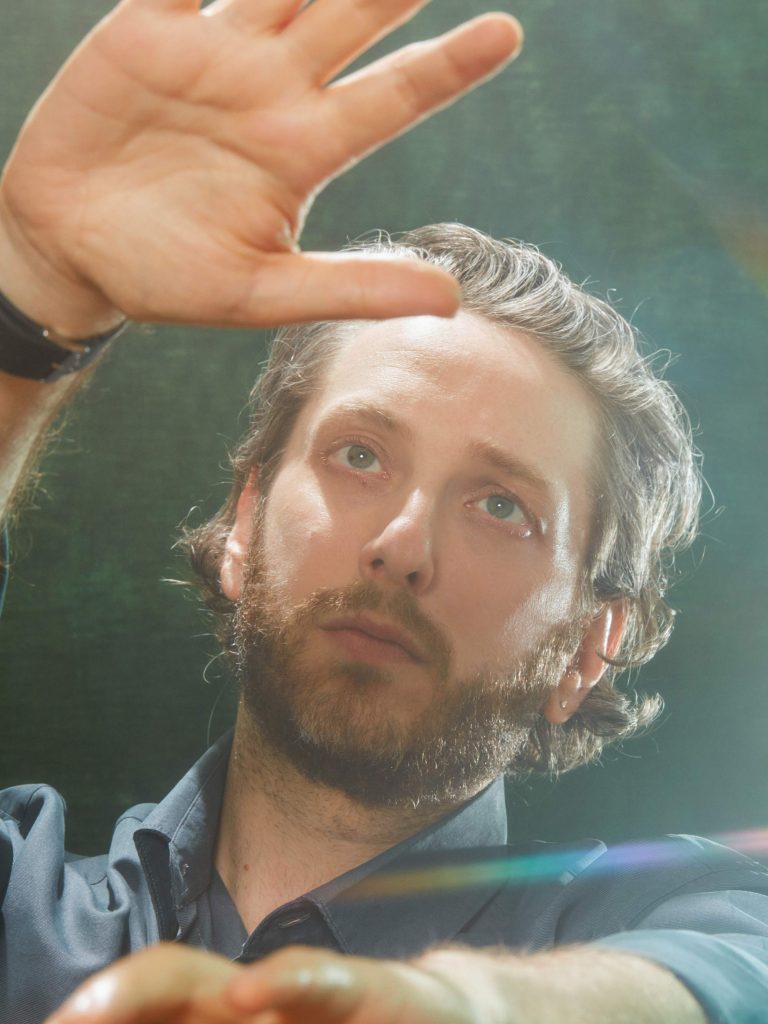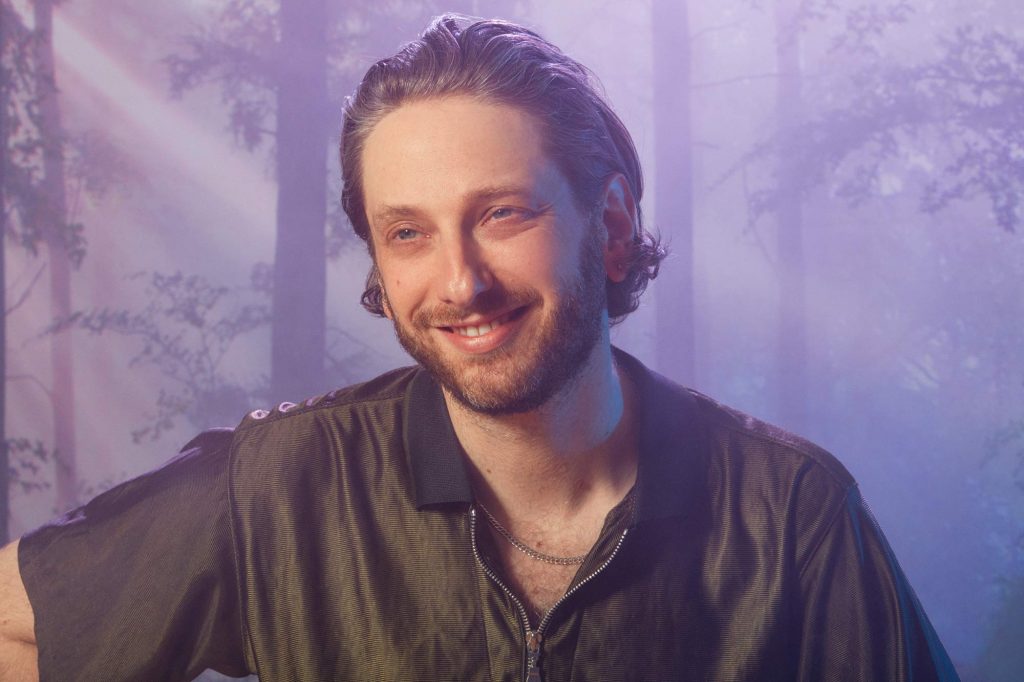Daniel Lopatin, aka Oneohtrix Point Never (OPN) is a highly acclaimed Brooklyn-based musician with an impressive body of work. His music spans across ambient, drone, and experimental, occasionally citing artists like Brian Eno and Aphex Twin. In 2017, he won the Cannes Soundtrack Award for his original score or the film “Good Time,” and more recently, he’s been credited as a producer on The Weeknd’s album, “After Hours,” which was released in March of this year to international acclaim. Lopatin’s work continuously grows in scale and reach.
Now, nearly two and a half years since his last album, OPN has released his new album, “Magic Oneohtrix Point Never.” (TOKiON the STORE is currently holding a pop-up celebrating the release) Critic Shun Fushimi asked OPN 10 questions to learn more about what’s behind OPN’s new album and creative philosophy.

Mixing things that seem inappropriate–that’s the kind of alchemy that I’m interested in.
Q1: One thing that stood out to me when I listened to your new album were the strings and harpsichord sounds. It seems like since “Age Of,” your music has taken an increasingly “chamber pop” approach. What are your thoughts on this change?
Oneohtrix Point Never (OPN): To be honest, I haven’t noticed that. For example, in “Replica,” I was using Mellotron strings too, and that came out in 2011. So I’m not sure if that analysis is accurate, but I love trying my hand at crazy string arrangements, which is why I do it. I guess that’s it. There’s this old AM radio format called “Beautiful Music,” which I was listening to a lot while making this album. It’s like a version of easy listening from before easy listening–music that uses a lot of very sugary, grandiose strings. Maybe that has something to do with it. “Beautiful Music” is a kind of muzak or background music that was played in stores, and there used to be radio stations solely dedicated to that kind of music. Like music that you’d hear on a mall escalator around the 1970s. It’s really interesting.
Q2: You mentioned that your new album is inspired by radio. I think radio is a form of media that’s more intimate than television or the internet. What does radio mean to you?
OPN: As someone who grew up listening to the radio, I feel like it was a form of technology that allowed me to develop my own taste. When I was young, I used to aircheck the radio and make radio mixtapes. That’s how I spent my free time. In any case, I loved everything about the radio, and how should I explain this…For example, I like the sound of switching between stations, or the fact that it can be completely random–like you can come across an unknown station one second, and then the next, you’re listening to a commercial station that’s packaged neatly into a more standard style. That’s why I thought the idea of having everything out there, just floating in the ether was cool. And in a way, you had to sift through and surf everything. That was fun.

Q3: Recent music by electronic artists like Arca, Yves Tumor, and George Clanton has a 70s glam rock vibe. It reminds of glam rock because of the conceptuality, mutant-like quality, emphasis on visuals, and critical view of earlier music. I felt the same vibe from your albums “Garden of Delete,” “Age of,” and your newest album. What are your thoughts on the anti-establishment rock of the 1970s?
OPN: Personally, when I mix two things that seem inappropriate–that’s the kind of alchemy that I’m interested in. In my new album, there’s a bit of hair metal, which could be considered a subgenre of glam rock. Near the end of the album, there’s a moment that’s really hair metal. I’m talking about the track “Lost But Never Alone.” What’s interesting to me about that song is that it’s a kind of a mixture of hair metal and goth. In the 80s, music fans were split into two camps: the hair metal crowd or the goth crowd, and if you liked both, people thought you were schizophrenic. Right? (laughs) So I thought, what would a song sound like if it embodied those two separate musical lifestyles at the same time? Or if it included the formal register of both genres? That was what sparked my interest.
But personally, I think that popular music exists on a continuum, where the novel use of music technology and novel songwriting techniques come together. This happens all the time in the world of popular music, which is why styles change in so many ways. But at the end of the day, popular music is like a conversation with itself. I guess it’s something that washes over us in a way, and it changes in real time in front of the listener, like a kind of reaction. Basically, it’s a reaction to what came before it, and it also changes in reaction to the technology that’s available. So it makes total sense that it all seems like a mishmash to me–because they exist on a continuum.
Melancholy is the emotion that produces the most beautiful music
Q4: This is a bit weird, but the album that your album reminds me of most is Smashing Pumpkins’ “Machina.” Have you heard of it? I think it’s because it has a heavy metal and new wave vibe, and the song “I of the Mourning” is about the radio. But also, I think it’s because it has a sentimental feeling. Until now, I hadn’t felt a sentimental nature to your work, but I was surprised that this album stirred up a sentimental feeling. Have you ever consciously incorporated that sentimentalism into your work? Sentimental, or maybe you could also say melancholy.
OPN: I’m not too familiar with it [“Machina”], but I know it. [Regarding melancholy] Yeah…in any case, one of the things that drew me and Abel [Makkonen Tesfaye], I mean The Weeknd, together is that we’re both really interested in the idea of melancholy…. it’s a funny thing, melancholy, isn’t it? I mean, it’s a bit like trying to get enjoyment out of your sadness. And that’s a really interesting thing when applied to music. And to me, that’s because most songs are like that. There’s your own sadness–you could call it the theater of emotions–and it’s about the full exploration of those emotions, which are carried into the music whether they’re negative or positive, and exploring the extremes of these emotions, and so on. And melancholy is…yeah, for me, melancholy is the emotion that produces the most beautiful kind of music. Of course, that’s just my personal opinion. But I really like the second part of Ravel’s “Gaspard de la nuit,” for example. It’s called “Le Gibet” and I like it because it’s strangely spacious, and it’s very sad. And there are so few notes in it, so it feels very weird. That’s why, how do I say this…because of that, it’s really strange. Like, it makes you feel sort of uneasy listening to it? Yeah…in any case, yeah, I do like melancholy. That’s for sure.
Q5: Your use of the arpeggiator is distinct, and it feels like a signature sound for you. Why do you use the arpeggiator so often?
OPN: Why do I use it so often? I can’t even answer that for myself! I like electronic music, and I just like the way the dispersed sequences of notes sound, but I guess that’s all I can say, yeah. The sound itself is really beautiful. That’s why I use it.
Q6: When you make music, are you putting your emotions into the work? Or are you making it in a more logical, level-headed way?
OPN: I’ve been doing it [making music] for long enough, so I guess it’s really intuitive now. Although that’s not to say that I’m making it without thinking. When I make music, I have a precise idea of what I’m trying to achieve, and while making an album, I know why it makes sense to put a sequence of songs together in a certain way. But those are all really intuitive decisions. In a way, those decisions aren’t really intellectually overwrought. Of course, I love thinking about it, and I love, after the fact, looking at it as a whole and thinking, “Wow! This turned out really interesting!” But what I’m trying to say here is that I create things intuitively. Hopefully.
There’s a difference between creating a musical score for a film and something that’s completely my own, like this new album. I need to use my intuition for both, but when creating a film soundtrack, there are practical objectives, so you have to make something that you can adapt, which is different. There are things like scene cues and length that you have to adjust the music to, and all the directors I’ve worked with are very, very….precious about their work, for good reason. They know exactly what they want the music to do. And it’s not necessarily just up to me to decide that. So it’s a conversation between my intuition and the director’s intuition, and that conversation becomes a kind of map. There has to be something that both parties agree on, and a goal you’re both working towards together, and yeah, it creates a kind of map. But when I work on my own, there’s not necessarily a map…. for example, with my new album, I just had the idea of making a self-titled record, so I started thinking of new ideas. From there, I thought it made sense to use a radio station as a setting for the album. So that’s how it came to be. I knew that much, and I didn’t know what was going to happen in terms of musical experimentation. I didn’t know how the album would actually turn out.

On dreaming up music that leaves “room” for the listener
Q7: Have you read any books recently that left an impression on you?
OPN: Oh, there was a book I read recently (voice trails off as he tries to find the book) …where is it…oh, here it is! It’s a book called “High Static,” or the full title is “High Static, Dead Lines: Sonic Spectres & the Object.” Basically it’s about various encounters with radio transmissions and other everyday sounds. Examples of strange things that happen during a radio broadcast and so on. (chuckles) It’s a book that investigates a variety of mysterious encounters. It’s a really cool book. I’m not a big fan of fiction. I’m more interested in reading non-fiction, like books on philosophy, sociology, and history.
Q8: I want to ask you about working with the Safdie brothers. I thought “Good Time” and “Uncut Gems” were rare masterpieces, but your contributions really brought them to the next level. I felt like you created a new kind of cinema. Did you approach the score with the idea of introducing a new kind of film soundtrack?
OPN: I think the first thing I tried to do was look within myself. And then, as I worked on it, I made edits and adjustments. So, I’m at the stage where the more I work with the Safdie brothers, the more I understand my own intuition. But I’ve never forced myself to do anything just because I think it’s a good idea. Usually, your own intuition is in charge anyway.
Q9: I was researching the Sherman brothers, who wrote musical scores for Disney movies, and they were second-generation Russian-Jewish immigrants like you. Your musical style is totally different from theirs, but I thought there was similarity in the feeling of being separated from a place, and imagining a different, new world that doesn’t exist. Do you feel that being a second-generation Russian immigrant has influenced you?
OPN: Hmmm…it probably has? But…I don’t know how to gauge it, I wouldn’t know how to give any answer…Because that’s truly complicated stuff, right? So… I was definitely influenced by my parent’s sensibilities. Sensibilities that aren’t American, but I personally was born and raised in America. I’m very much an American-born kid, who grew up in a Russian immigrant family.….and of course, I’ve gone through some very unique experiences growing up like that. But, how has that experience affected the music I make? You’d have to ask a Freudian psychologist or something .
It’s true that I’m really trying to make music that’s personal. But, even then, it doesn’t mean that I’m trying to make music that’s similar to the music that has influenced me, or the music that inspired me to become an artist. So, how does it all relate to my upbringing? That’s hard for me to say. Because for some people, their introduction to the world of music and film was simply their parents’ record or videotape collection. Psychologically, I think I was more influenced by my parent’s VHS tapes. They had a film called “White Nights” (1985) starring Mikhail Baryshnikov on VHS, but we didn’t have a single record at home. (laughs) But, “White Nights” had music in it! There was a Lou Reed song, “My Love is Chemical,” on the soundtrack, and it’s a very weird Lou Reed song–a synth pop song. It’s a really strange song, sort of like it’s so bad that it’s good? (laughs) You should check it out. It’s really weird.
Q10: You’ve spoken in previous interviews about how you’ve been influenced by artists who defined the ambient genre, like Brian Eno and William Basinski. While your recent work has moved away from ambient music, I thought both your recent radio-inspired album and your film scores both present the same challenge as ambient music, which is that you have to think about what kind of environment people will listen to the music in. I feel like that idea behind ambient has become more important with the rise of streaming services. What do you think about the concept behind ambient now?
OPN: The effect that people are looking for from ambient is that when they listen, everything slows down, and that’s how to create a kind of space, terrain that’s free of interference, somehow. I don’t think that’s possible, frankly. But even still, I think that ambient music can be really, really beautiful. I love quite a bit of it, and I’ve had occasions of it. But I never listen to ambient music with a sense of purpose. That’s why I don’t really listen to music to relax, fall asleep, or chill out.
When I make music, I think about how people will listen to it. Having said that, I think my answer has two parts. First, I make music that I want to hear. But second, at the same time, I’d like to make music that also holds enough space for the people who listen to it, so it allows everyone to encounter the music in their own unique, creative way. Music should leave some room for that. I try to dream up music that’s ambiguous and can be interpreted in many ways, leaving room for the listener to dream. But at the same time, it needs to be fundamentally enchanting to me. Otherwise, I’d probably get really frustrated and bored. Basically, I have to make music…. to feel like I can express something that hasn’t existed. That’s my motivation, yeah.

■Oneohtrix Point Never POP-UP STORE
Dates: October 31st – November 15th
Location: TOKiON the STORE
Address: North 2F MIYASHITA PARK 6-20 Jingumae Shibuya-ku Tokyo
Time: 11:00 – 21:00
Question and Japanese Translation Mariko Sakamoto
Translation (Japanese to English) Aya Apton
Photography David Brandon

